Journey to the Sun Live
Journey to the Sun live will be back in spring of 2026, thank you for your participation.
Past events
Friday, September 27, 2024
NASA’s Fleet of Solar Spacecraft
Location: In person at Southern Illinois University Carbondale, Moris Library, Guyon Auditorium. Watch and discuss on YouTube Live @NASASolarSTEAM
The Sun impacts many aspects of our daily lives; some of its effects are more obvious, like those on weather patterns and agriculture, while other effects are more subtle, like space weather and auroras. In order to study the Sun and its interactions with the Earth in more detail, NASA has launched a series of heliophysics spacecraft that focus all their time and energy on studying the Sun and its surrounding environment. Join us for a tour through some of NASA’s more successful solar probes. We will talk about the spacecraft themselves as well as some of their more exciting scientific discoveries.
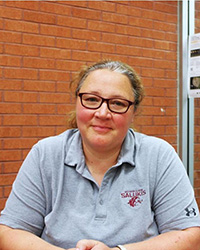
Friday, October 25, 2024
The Sun’s Role in the Earth’s Climate
Location: In person at Southern Illinois University Carbondale, Moris Library, Guyon Auditorium. Watch and discuss on YouTube Live @NASASolarSTEAM
The Earth’s climate is a dynamic system that responds in complex ways to changes in the amount of energy received and lost. Energy received from our Sun is the primary energy input to the system and initiates variations in climate across different timescales. In this talk, we will explore how climate-system processes can alter the climate response, sometimes in surprising ways that are different from what we’d expect.
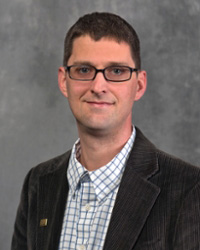
Friday, December 6, 2024
Space Weather
Location: In person at Southern Illinois University Carbondale, Moris Library, Guyon Auditorium. Watch and discuss on YouTube Live @NASASolarSTEAM
Just as there is weather within our atmosphere (like rain, snow, heat, and wind), space weather can come in the form of radio blackouts, solar radiation storms, and geomagnetic storms caused by disturbances from the Sun. Unlike terrestrial weather events, like a hurricane, space weather has the potential to impact not only the United States, but wider geographic regions. These complex events can have significant economic consequences and have the potential to negatively affect numerous sectors, including communications, satellite and airline operations, manned space flights, navigation and surveying systems, as well as the electric power grid. This talk addresses what drives space weather, what its effects are, and what efforts are being made to predict it.
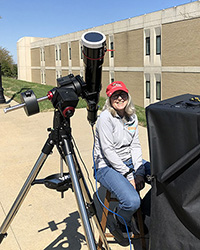
Dr. Margaret “Peggy” Hill, received her Bachelor’s degree in physics at the College of William and Mary in Virginia. She taught physics and physical science at the high school and junior high level for 9 years before returning to school to get her PhD in condensed matter physics at Southern Illinois University-Carbondale studying magnetic materials. She joined the faculty of Southeast Missouri State University in 2000 where she taught courses in physics, astronomy, and science education. In 2017 she and Dr. Mike Rogers became lead volunteers for Citizen CATE Team-040, one of the 68 national sites dedicated to taking photographs during totality to study the time evolution of the sun’s corona. She was a State Coordinator and again a Team Lead for CATE 2024 team 017 based in McLeansboro, IL, photographing the sun’s corona in polarized light, during the April 8 total solar eclipse.
Friday, January 31, 2025
Remembering the 2024 Total Solar Eclipse – SIU Student Experiences
Location: In person at Southern Illinois University Carbondale, Moris Library, Guyon Auditorium. Watch and discuss on YouTube Live @NASASolarSTEAM
On April 8, 2024, an estimated 30,000 people from around the world visited the SIU campus to view a total solar eclipse. SIU students were a critical component in the success of that major event. Hundreds of student volunteers assisted in countless roles; they collected research data, managed a livestreaming broadcast of the eclipse, provided outreach to visitors on campus, and assisted with so many other necessary duties. Through all the work of everyone involved, SIU was able to offer an amazing “once in a lifetime experience” for all who visited campus.
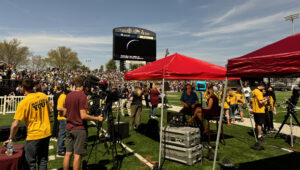
A panel of students who held a variety of roles during the eclipse will share their recollections and talk about the lessons they learned by being involved in this amazing project. Included will be students who were part of the telescope team that collected eclipse images that were used by national media around the country. Also presenting will be students who were part of the team that created a live streaming broadcast of the event which was seen by viewers around the world.
Friday, Febuary 28, 2025
Location: In person at Southern Illinois University Carbondale, Moris Library, Guyon Auditorium. Watch and discuss on YouTube Live @NASASolarSTEAM
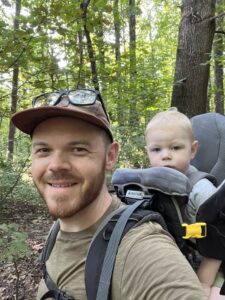
Friday, March 28, 2025
Impact of a Solar Eclipse on a Bee Colony
Location: In person at Southern Illinois University Carbondale, Moris Library, Guyon Auditorium. Watch and discuss on YouTube Live @NASASolarSTEAM
Presenters: Dr. Steevn Still, Dr. Logan Park, Chris Roberts and Emma Wiker.
During the April 8, 2024, total solar eclipse, Dr. Still and his team studied how a bee colony responds to the rapid changes in daylight and temperature brought on by a total solar eclipse. The research team, which includes two SIU students, will present their study as well as their current findings.
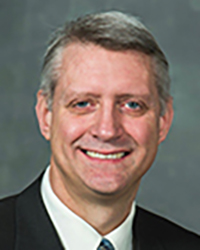
Steven Still, Assistant Professor, Southern Illinois University School of Agricultural Systems and Education. Dr. Still was born in Champaign, Illinois and raised in Columbus, Ohio. He completed his BS in agriculture with a minor in agriculture education at The Ohio State University before teaching high school agriculture for eight years in central Ohio, during which time he earned his M.Ed. He earned his MS in crop sciences and his Ph.D. in Curriculum and Instruction at The University of Illinois.
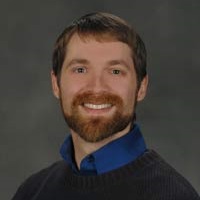
Dr. Logan O. Park is the Associate Professor of Forest Recreation and Park Management in the Forestry Department of Southern Illinois University Carbondale. He has completed degrees in Environmental Chemistry (B.S., Furman University), in Natural Resources Planning – recreation management (M.S., The University of Vermont) and in Forestry – interdisciplinary studies in the sociology and ecology of outdoor recreation (Ph. D., Virginia Polytechnic Institute and State University). His current research interests include mechanisms of impacts to soundscapes, cultural resources, soils, vegetation, water, and wildlife; computer simulation modeling of protected area planning measures; practical indicators, standards, and monitoring methods development; and integrated management approaches to preventing/mitigating resource impacts and protecting visitor experiences.

Christopher Roberts is Agriculture Education Undergrad at SIU. He completed an AAS in Horticulture from MCC where he was also a greenhouse worker under Department Chair Dr.Beier. He plans to enjoy his summer in the garden with his mother.
Tuesday, April 8, 2025
Celebrating the One Year Anniversary of the 2024 Total Solar Eclipse
Location: In person at Southern Illinois University Carbondale, Morris Library, Guyon Auditorium. Watch and discuss on YouTube Live @NASASolarSTEAM
Moderator: Corinne Brevik
Panelists: Bob Baer, Karla Berry, Matt Williams, Sarah Vanvooren, Gena Albert
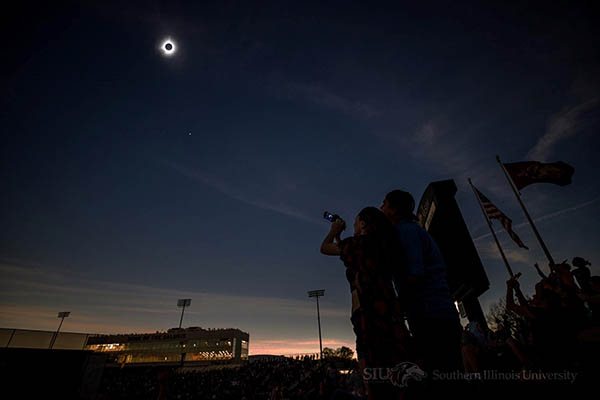
Southern Illinois University became the Eclipse Crossroads of America when it found itself in the path of totality for two total solar eclipses happening within seven years, the first in 2017 and the second in 2024. A team of amazing faculty, staff, students, and volunteers worked tirelessly to create a series of events on the SIU campus for each eclipse so that visitors from all around the world could enjoy this unique experience. For each eclipse, an estimated 30,000 people visited our campus, taking advantage of this amazing “once (or twice) in a lifetime” opportunity.
April 8, 2025, marks the one-year anniversary of the 2024 total solar eclipse. Five of the faculty and staff who held leadership roles in the planning of this momentous event will talk about the work that led up the Crossroads Eclipse Festival as well as some lessons learned by hosting two such large events. They will discuss some of the planning required to accommodate tens of thousands of people, organize a plethora of events including a stadium show and a research expo, run both live telescope feeds and a livestreaming broadcast, work with national media outlets, and so much more.
Join us for a chance to reminisce on the amazing events of last year’s total solar eclipse.
Friday, April 25, 2025
Understanding Sun Exposure Risks in Military Personnel: A Public Health Perspective.
Location: In person at Southern Illinois University Carbondale, Moris Library, Guyon Auditorium. Watch and discuss on YouTube Live @NASASolarSTEAM
Sun exposure represents a major occupational hazard for military personnel, substantially increasing their risk for both melanoma and nonmelanoma skin cancers. This presentation will discuss specific challenges faced by service members, especially those deployed in high-sun environments, and the effectiveness of current military gear and practices in offering essential UV protection. Highlighting variations in skin cancer rates across different branches and ranks, the discussion will focus on the need for responsive strategies in prevention and screening and compare proposed advancements to safeguard at-risk personnel.
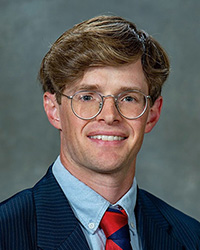
Justin McDaniel, PhD, is an Associate Professor of Public Health in the School of Human Sciences at Southern Illinois University. He also has a joint appointments in the Dale and Deborah Smith Center for Alzheimer’s Research and trEatment (CARE) and the Department of Population Science and Policy in the Southern Illinois University School of Medicine. His scholarly interests center on social determinants of health among military veterans.
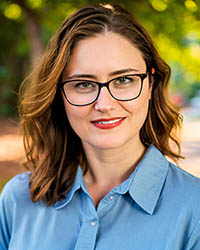
Claire Hughes, MSW & LSW, is a doctoral student in Population Health at Southern Illinois University Carbondale, where she also completed a master’s degree in Social Work. A native of Southern Illinois, Claire currently works as an instructor of Community Health Programming for the Illinois Public Health Association. Her research focuses on health promotion and the social drivers of health.
